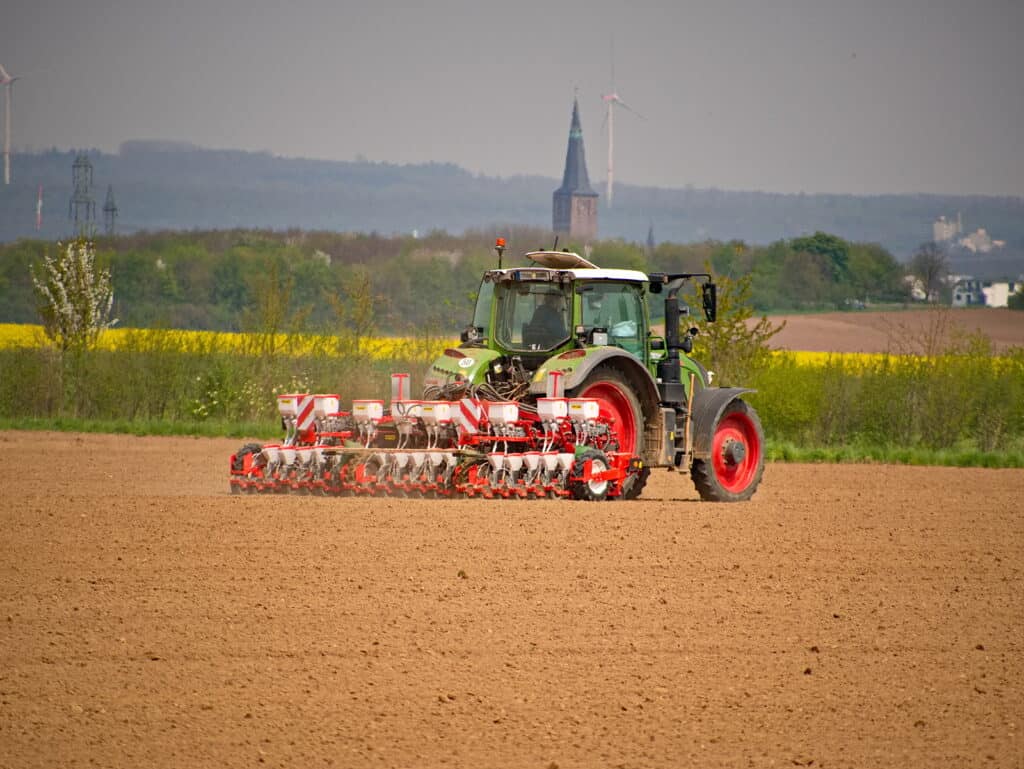Energy Efficiency in Sustainable Agriculture
In our ever-changing world, the dynamic relationship between agriculture and sustainability has captured my unwavering attention. As global challenges loom and our population burgeons, the imperative to cultivate food efficiently and sustainably has become paramount. At the heart of this mission lies a critical objective: optimizing energy usage in agriculture.
In my exploration, I am intrigued by the profound impact of integrating renewable energy sources like solar and wind power into farming practices. This transformative synergy not only reduces our dependence on fossil fuels but also ushers in energy savings and a notable reduction in our carbon footprint. As I venture into this realm, I am excited to uncover the intricate tapestry that weaves together energy efficiency and the sustainable future of agriculture.
Understanding Energy Efficiency in Agriculture
Energy efficiency within the realm of agriculture delves into a sophisticated realm where the harmonious interaction between energy inputs and agricultural outputs takes center stage. This intricate concept revolves around the meticulous orchestration of energy resources to garner optimal crop yields, all while meticulously curbing energy dissipation and mitigating the ecological footprint.
At its core, the positions of energy efficiency in agriculture transcends mere agricultural practices; it is a paradigm shift toward the fusion of ingenuity and sustainability. This entails the deliberate integration of cutting-edge methodologies and technologies that weave through the very fabric of the agricultural production continuum. From the initial stages of planting and nurturing to the culminating moments of bountiful harvest, the tapestry of energy-efficient techniques is interwoven to paint a portrait of agricultural productivity in harmony with the environment.
The Importance of Energy Efficiency in Sustainable Agriculture
As global populations continue to rise, the demand for food is also escalating. This puts immense pressure on agricultural systems, leading to increased energy consumption. However, this energy consumption often comes from non-renewable sources, contributing to carbon emissions and environmental degradation.
Energy efficiency of agriculture in sustainable agriculture is pivotal for several reasons:
- Mitigation of Environmental Impact: The adoption of energy-efficient strategies assumes the mantle of a global steward, aiding in the substantial reduction of the carbon footprint emanating from agricultural operations. Through judiciously curtailed reliance on fossil fuels, which stand as the principal architects of greenhouse gas emissions, these practices enact a tangible contribution towards environmental preservation.
- Guardianship of Finite Resources: Traditional agricultural methodologies, steeped in conventional wisdom, often exact a toll on precious resources such as water reserves and soil vitality. The tenets of energy-efficient approaches advocate for an enlightened custodianship, advocating for the responsible management of these invaluable resources. By doing so, they ensure the sustenance of these lifelines for posterity.
- Fiscal Prudence and Prosperity: Beyond its environmental implications, environmental and energy efficiency becomes an emblem of prudent financial management. The judicious allocation and utilization of energy resources translate into tangible economic benefits for farmers. By curbing excessive energy expenditures, operational costs are diminished, thereby paving the way for augmented profitability and bolstered financial resilience.

Key Strategies for Energy-Efficient Agriculture
Precision Agriculture and Technology Integration
Precision agriculture leverages cutting-edge technologies such as GPS, remote sensing, and data analytics to optimize resource utilization. By precisely tailoring irrigation, fertilization, and pest control, farmers minimize wastage while maximizing yields. Advanced sensors and monitoring systems provide real-time insights, enabling timely interventions and resource adjustments.
Renewable Energy Integration
Embracing renewable energy sources like solar panels and wind turbines can significantly reduce the reliance on non-renewable energy. Solar-powered irrigation systems, for instance, harness sunlight to water crops, diminishing the carbon footprint and energy costs associated with traditional irrigation methods.
Crop Rotation and Diversification
Monoculture farming practices can drain soil nutrients and increase pest susceptibility. Implementing crop rotation and diversification rejuvenates soil health, reducing the need for excessive fertilizers and pesticides. This, in turn, curtails energy-intensive manufacturing and application processes.
Integrated Pest Management (IPM)
IPM combines biological, chemical, and cultural practices to manage pests effectively. By minimizing the indiscriminate use of chemical pesticides, farmers curtail the energy expended in their production, distribution, and application, while maintaining a balanced ecosystem.
Conservation Tillage Techniques
Traditional tillage methods disrupt soil structure and necessitate substantial energy inputs. Conservation tillage practices, such as no-till or reduced tillage, minimize soil disturbance. This conserves energy, maintains soil integrity, and enhances water retention.
Efficient Water Management
Water is a precious resource, and its efficient use is paramount. Drip irrigation and soil moisture sensors aid in targeted water application, reducing both energy-intensive water pumping and water wastage.
Cover Crops and Green Manure
Introducing cover crops and green manure enhances soil fertility, reduces erosion, and minimizes weed growth. The subsequent reduction in chemical fertilizer and herbicide usage not only conserves energy but also fosters a healthier agroecosystem.
Utilization of Organic Matter
Incorporating organic matter into the soil improves its structure and water-holding capacity. As a result, the need for energy-intensive soil additives and conditioners is mitigated, promoting resource efficiency energy.

Benefits of Sustainable Agriculture
Implementing energy-efficient practices in sustainable agriculture yields a multitude of benefits:
Water Resource Management
Energy-efficient practices harmonize with responsible water management. By optimizing irrigation systems, these practices mitigate water wastage, ensuring that the aquatic life within and beyond agricultural landscapes thrives. This, in turn, fortifies local ecosystems and safeguards the purity of water bodies.
Soil Vitality Preservation
Within the embrace of energy-efficient practices lies a commitment to preserving the heartbeat of agriculture: the soil. By reducing excessive tilling and chemical interventions, these practices nurture soil health. This rejuvenation of soil vitality bolsters its capacity to sequester carbon, enhance nutrient retention, and yield robust, nutrient-rich crops.
Community Empowerment
Energy-efficient practices extend their benevolence beyond the boundaries of farmlands. As these practices gain traction, they not only enhance agricultural productivity but also fortify the fabric of local communities. Farmers, equipped with sustainable practices, become conduits of knowledge, empowering neighbors and kin with skills that amplify local food security.
Mitigation of Energy Dependency
Embracing energy-efficient practices curtails the agricultural sector's reliance on energy derived from non-renewable sources. This catalyzes a seismic shift toward renewable energy integration, nurturing a future where agricultural endeavors are powered by the elements themselves, thereby reducing greenhouse gas emissions.
Enhanced Rural Livelihoods
Energy-efficient practices dovetail with rural livelihood enhancement. As operational costs decrease due to optimized energy utilization, farmers' financial burdens are alleviated. This financial respite translates into improved economic stability, invigorating rural economies and fostering a cycle of prosperity.
Carbon Footprint Reduction
The very essence of energy-efficient practices is enshrined in the pledge to curtail carbon emissions. By minimizing energy wastage and refining energy consumption patterns, these practices chisel away at the agricultural sector's carbon footprint. This collective effort paints a cleaner canvas for future generations.
Regenerative Agriculture Promotion
Energy-efficient practices are aligned with the principles of regenerative agriculture. They go beyond sustainability, aiming to restore and revitalize ecosystems. These practices holistically heal the land, nurture biodiversity, and ultimately enhance the overall ecological resilience of agricultural landscapes.
Global Environmental Contribution
The global impact of energy-efficient agriculture is profound. By reducing the environmental toll of agricultural activities, these practices contribute to the broader fight against climate change and environmental degradation. Their ripple effect extends to the broader ecosystem, reminding us of the interconnectedness of all life forms on Earth.
The Futuristic Farms video
Where to Access Resources for Energy-Efficient Agriculture
Embarking on the transformative journey of integrating energy-efficient practices into agriculture is akin to navigating uncharted waters. To successfully set sail on this quest, arming oneself with an arsenal of knowledge, tools, and resources is paramount. Within this landscape, a constellation of invaluable sources illuminates the path toward sustainable agricultural evolution. These founts of wisdom, each a tributary in the river of progress, converge to empower farmers with the insight and means needed for a fruitful voyage:
Government Agricultural Agencies
The bastions of governmental commitment to agricultural advancement often prove to be the vanguard in disseminating the wisdom of energy-efficient practices. Their repositories are replete with guides, financial support avenues, and technical expertise that shepherd farmers toward sustainable horizons. These agencies stand as pillars of guidance, bridging the gap between policy and practical implementation.
Agricultural Extension Services
Woven into the very fabric of farming communities, agricultural extension services offer a localized haven of wisdom. With a mosaic of guidance, workshops, and tailor-made training, these services are a beacon of light for farmers seeking to sow the seeds of energy-efficient methodologies within their operations. Their presence transcends advice; it transforms agricultural landscapes through hands-on education.
Research Institutions and Universities
In the hallowed halls of research institutions and universities, a symphony of innovation resonates. Academic minds delve deep into the heart of sustainable agriculture, unraveling its intricacies and laying bare its secrets. Their findings are disseminated through an array of mediums—publications, seminars, workshops—each note of insight contributing to the grand symposium of agricultural transformation.
Nonprofit Organizations
Dedicated to the virtuous cause of sustainable agriculture, nonprofit organizations emerge as allies for farmers seeking resources and support. Through their altruistic endeavors, they extend a lifeline of opportunities—resources, grants, networking—that cultivates a camaraderie of like-minded individuals. Together, they fortify the edifice of sustainable farming, transcending mere individual efforts.
Online Platforms and Forums
The digital tapestry weaves threads of connectivity among farmers across the globe. Online platforms and forums provide an interactive haven where experiences are exchanged, advice is sought, and resources are shared. In this virtual agora, farmers harmonize their energies, bridging geographical gaps to forge a united front in the quest for energy-efficient agricultural marvels.
Conclusion
As I bring this journey through energy efficiency in sustainable agriculture to a close, I'm truly invigorated by the profound potential embedded in the intricate balance between our farming practices and the environment. This exploration has illuminated not only the intricate dance between energy and agriculture but also kindled a passionate drive within me to advocate for this cause. It's clear that our commitment to cultivating food sustainably is a promise not just to ourselves, but to the Earth and to future generations.
This voyage has solidified my understanding that every action, no matter how seemingly small, has the power to echo through ecosystems and reverberate in the lives of those who depend on our planet's resources. As we stand at the crossroads of tradition and innovation, let's embrace our roles as stewards of the land.
By incorporating energy-efficient practices into our agricultural landscape, we can create a future where our farms not only yield nourishment but also exemplify resilience and sustainability. With each step toward mindful farming and each decision to conserve energy, we weave a tapestry of harmony between agriculture and the environment, shaping a narrative of hope and transformation for generations to come.

